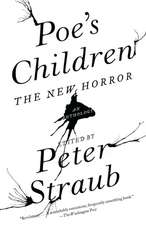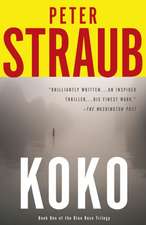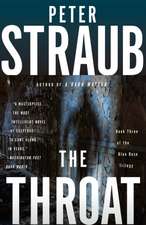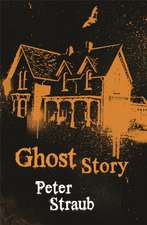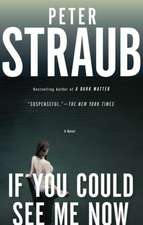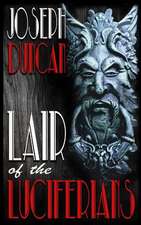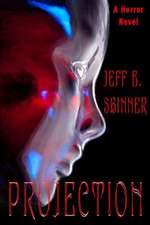Mystery
Autor Peter Strauben Limba Engleză Paperback – 31 dec 2009
| Toate formatele și edițiile | Preț | Express |
|---|---|---|
| Paperback (2) | 90.92 lei 42-47 zile | |
| Anchor Books – 31 dec 2009 | 124.39 lei 3-5 săpt. | |
| HarperCollins Publishers – 14 noi 1990 | 90.92 lei 42-47 zile |
Preț: 124.39 lei
Nou
Puncte Express: 187
Preț estimativ în valută:
23.80€ • 24.85$ • 19.70£
23.80€ • 24.85$ • 19.70£
Carte disponibilă
Livrare economică 14-28 martie
Preluare comenzi: 021 569.72.76
Specificații
ISBN-13: 9780307472229
ISBN-10: 0307472221
Pagini: 548
Dimensiuni: 130 x 206 x 26 mm
Greutate: 0.4 kg
Editura: Anchor Books
ISBN-10: 0307472221
Pagini: 548
Dimensiuni: 130 x 206 x 26 mm
Greutate: 0.4 kg
Editura: Anchor Books
Recenzii
“A dark, labyrinthian tale of murder and family relationships. . . . Mesmerizing.” —Chicago Sun-Times
“Sensational. . . . A terrific page-turner, superbly plotted, unforgettable characters.” —Kansas City Star
“Intriguing, immensely readable. . . . Engages the mind.” —Washington Post Book World
“The near perfect mystery. . . . Has everything a classic whodunit should. . . . Full of intricate, engrossing, flesh-and-blood suspects and heroes. . . . Unexpected curves and potholes. . . . The title says it all.” —Milwaukee Sentinel
“Murder, mayhem, mystery. . . . A complex and satisfying tale. . . . Compelling characters. . . . A pulse-pounding climax.” —Cleveland Plain Dealer
“A tightly woven-tale, crisply rendered, populated with well-drawn characters.” —San Francisco Chronicle
“Marvelous. . . . Enormously satisfying. . . . Unashamedly designed to fascinate.” —Sacramento Bee
“The best of Peter Straub’s writing.” —Houston Chronicle
“The characters are outstanding. . . . They are the story, enshrouded by a nightmare that never lifts. Peter Straub takes bold risks and he succeeds.” —San Jose Mercury News
“Enomously entertaining and scary. . . . Rich, complex, dark, and tough to put down.” —New York Daily News
“Sensational. . . . A terrific page-turner, superbly plotted, unforgettable characters.” —Kansas City Star
“Intriguing, immensely readable. . . . Engages the mind.” —Washington Post Book World
“The near perfect mystery. . . . Has everything a classic whodunit should. . . . Full of intricate, engrossing, flesh-and-blood suspects and heroes. . . . Unexpected curves and potholes. . . . The title says it all.” —Milwaukee Sentinel
“Murder, mayhem, mystery. . . . A complex and satisfying tale. . . . Compelling characters. . . . A pulse-pounding climax.” —Cleveland Plain Dealer
“A tightly woven-tale, crisply rendered, populated with well-drawn characters.” —San Francisco Chronicle
“Marvelous. . . . Enormously satisfying. . . . Unashamedly designed to fascinate.” —Sacramento Bee
“The best of Peter Straub’s writing.” —Houston Chronicle
“The characters are outstanding. . . . They are the story, enshrouded by a nightmare that never lifts. Peter Straub takes bold risks and he succeeds.” —San Jose Mercury News
“Enomously entertaining and scary. . . . Rich, complex, dark, and tough to put down.” —New York Daily News
Notă biografică
PETER STRAUB is the New York Times bestselling author of more than a dozen novels. In the Night Room and Lost Boy, Lost Girl are winners of the Bram Stoker Award, as is his collection 5 Stories. Straub is the editor of numerous anthologies, including the two-volume American Fantastic Tale from the Library of America. He died in 2022.
Extras
1
One June day in the mid-fifties Tom Pasmore, a ten-year-old boy with skin as golden as if he had been born with a good fourth-day suntan, jumped down from a milk cart and found himself in a part of Mill Walk he had never seen before. A sense of urgency, of impendingness, had awakened him with the screams that came from his mother's bedroom and clung to him during the whole anxious, jittery day, and when he waved his thanks to the driver, this feeling intensified like a bright light directed into his eyes. He thought of hopping back on the milk cart, but it was already jingling away down Calle Burleigh. Tom squinted into the bright dusty haze through which passed a steady double stream of bicycles, horse carts, and automobiles. It was late afternoon, and the light had a molten, faintly reddish cast that suddenly reminded him of panels from comic books: fires and explosions and men falling through the air.
In the next moment this busy scene seemed to suppress beneath it another, more essential scene, every particle of which overflowed with an intense, unbearable beauty. It was as if great engines had kicked into life beneath the surface of what he could see. For a moment Tom could not move. Nature itself seemed to have awakened, overflowing with being.
Tom stood transfixed in the heavy, slanting reddish light and the dust rising from the roadway.
He was used to the quieter, narrower streets of the island's far east end, and his glimpse of a mysterious glory might have been no more than a product of the change from Eastern Shore Road. What he was looking at was another world, one he had never seen before. He had no exact idea of how to get back to the far east end and the great houses of Eastern Shore Road, and less idea of why he was searching for a certain address. A bicycle bell gave a rasping cry like the chirp of a cricket, a horse's ironclad hoof struck the packed dirt of Calle Burleigh, and all the sounds of the wide avenue reached Tom once again. He realized that he had been holding his breath, and that his eyes were blurry with tears. Already far down the avenue, the milk driver tilted toward the sun and the sturdy brown cob that pulled his cart. The ching-ching-ching of the bottles had melted into the general hum. Tom wiped moisture from his face. He was not at all sure of what had just happened-another world? Beneath this world?
Tom continued to melt back into the scene before him, wondering if this experience, still present as a kind of weightlessness about his heart, was what had been impending all during the day. He had been pushed-pushed right out of his frame. For an elastically long second or two-for as long as the world had trembled and overflowed with being-he had been in the other world, the one beneath.
Now he smiled, distracted by this notion from Jules Verne or Robert Heinlein. He stepped back on the sidewalk and looked east. Both sides of the wide avenue were filled with horses and vehicles, at least half of which were bicycles. This varied crowd moved through the haze of light and dust and extended as far as Tom could see.
It seemed to Tom that he had never really known what the phrase "rush hour" meant. On Eastern Shore Road, rush hour consisted of a car or two honking at children to get out of the street. Once Tom had seen a servant ride a bicycle straight into the bicycle of another servant, spilling clean white laundry all over the warm red brick of the road-that was rush hour. Of course Tom had been in his father's office in the business district; he had seen the midday traffic on Calle Hoffmann; and he had gone to the harbor, Mill Key, with his parents and passed beneath rows of palms in the company of jitneys and cabs and broughams; and at Mill Key he had seen the conveyances drawn up to take the new arrivals downtown to their hotels, the Pforzheimer or the St. Alwyn. (Strictly speaking, Mill Walk had no tourist hotels. The Pforzheimer took in bankers and moneymen, and the St. Alwyn catered to drummers, traveling musicians like Glenroy Breakstone and the wondrous Targets, gamblers, that class of person.) He had never been in the business district at the close of a workday, and he had never seen anything like the sweep and the variety of the traffic moving east and west, primarily west, toward Shurz Bay and Elm Cove, on Calle Burleigh. It looked as though everyone on the island had simultaneously decided to dash off to the island's other side. For a moment of panic that seemed oddly connected to the wonderful experience he had just undergone, Tom wondered if he would ever be able to find his way back again.
But he did not want to go home, not until he had found a certain house, and he imagined that when the time came he would find someone as accommodating as the milk driver, who in spite of the NO PASSENGERS ALLOWED sign at the front of the cart had invited him to hop on board and then quizzed him about girlfriends all during the long trip west-Tom was big for his age, and with his blond hair and dark eyes and eyebrows he looked more like thirteen than ten. This thing had been nagging at him all day, making it impossible to read more than a page or two at a time, driving him from his bedroom to the living room to the white wicker furniture on the porch, until at last he had resorted to walking back and forth on the big front lawn, wondering vaguely if Mrs. Thielman's Sam might run into Mrs. Langenheim's Jenny again, or if a crazy drunk might wander into the street and start yelling and throwing rocks, as had happened two days before.
The funny thing was that though the feeling of glory, overflowing being, had passed, the other feeling did not fade with it but lingered, as powerful as ever.
He was being pushed, being moved.
Tom turned around to get a better fix on this strange area, and found himself looking between two sturdy wooden houses, each placed atop its own narrow slanting lawn like a nut on a cupcake, at another row of houses set behind them on the next street. Tall elms arched over this second street, which seemed as quiet as Eastern Shore Road. The houses beneath the elms were one notch less impressive than those on Calle Burleigh. Tom instantly understood that this second street was forbidden territory. This information was not ambiguous. The little street might as well have had a chain-link fence around it and a sign commanding him to KEEP OUT: a spear of lightning would sizzle right down out of the sky and impale him if he entered that street.
The imaginary light that shone on his face became stronger and hotter. He had been right to come all this way. He stepped sideways, and a little two-story wooden house painted a very dark brown on the top story and a bright buttery yellow on the bottom came into view on the forbidden street.
Two days earlier, Tom had been lying on the striped yellow chaise in the living room reading Jules Verne, inside the imaginary but total safety of words on a page organized into sentences and paragraphs-a world both fixed and flowing, always the same and always moving and always open to him. This was escape. It was safety. Then a loud noise, the sound of something striking the side of the house, had pulled him up on the yellow chaise as roughly as a hand shaking him from sleep. A moment later Tom heard a blurry voice shouting obscenities in the street. "Bastard! Shithead!" Another rock crashed against the side of the house. Tom had jumped from the chaise and moved to the front window, unconsciously keeping his place in the book with his index finger. A middle-aged man with a thick waist and short, thinning brown hair was weaving back and forth on the sidewalk beside a slumped canvas bag from which a few large stones had spilled. The man held a baseball-sized rock in each hand. "Do me like this!" he yelled. "Think you can treat Wendell Hasek like he's some kind of jerk!" He turned all the way around and nearly fell down. Then he rounded his shoulders like an ape and squinted furiously at the two houses-each with great columns, round turrets, and twin parapets-across the street. One of these, the Jacobs house, was empty because Mr. and Mrs. Jacobs had gone to the mainland for the summer; the other was inhabited by Lamont von Heilitz, a fantastic and sour old man who lived in the shadows and echoes of some vague ancient scandal. Mr. von Heilitz always wore gloves, pale grey or lemon yellow, changed clothes five or six times a day, had never worked a single day in his whole life, and darted out on his porch to yell at children who threatened to step on his lawn. The chaos-man hurled one of his rocks toward the von Heilitz house. The rock banged against the rough stone side ofthe house, missing a large leaded window by only a few inches. Tom had wondered if Mr. von Heilitz would materialize on his front porch shaking a fist in a smooth grey glove. Then the man twitched his head as if to dislodge a fly, staggered back a few steps, and bent down for another rock, either forgetting the spare in his left hand or feeling that one rock was simply not enough. He thrust his hand into the canvas sack and began rooting around, presumably for a rock of the proper dimensions. He wore wash pants and a khaki shirt unbuttoned half of the way down the bulge of his stomach. His suntan ended at an abrupt line just below his neck-the protruding stomach was a stark, unhealthy white. The chaos-man lost his balance as he leaned down deeper into the bag and toppled over on his face. When he got himself up on his knees again, blood covered the lower half of his face. He was squinting now at Tom's house, and Tom stepped back from the window.
Then Tom's grandfather, Glendenning Upshaw, the most imposing figure in his life, came heavily down the stairs in his black suit, passed his grandson without acknowledging him, and slammed the front door behind him. Tom instinctively knew that the chaos-man had come for his grandfather and no one else, and that only his grandfather could deal with him. Soon his grandfather appeared, making his way down the walkway toward the sidewalk, thumping the tip of his unfurled umbrella against the pavement. The intruder shouted at Tom's grandfather, but Tom's grandfather did not shout back. The intruder fired a rock into Gloria Pasmore's roses. He fell down again as soon as Tom's grandfather reached the sidewalk. To Tom's astonishment, his grandfather picked the man up, taking care not to bloody his suit, and shook him like a broken toy. Tom's mother began yelling incoherently from an upstairs window and then abruptly stopped, as if she had just taken in that the whole neighborhood could hear her. Tom's father, Victor Pasmore, came down and joined Tom at the window, staring out with a careful neutrality that excluded Tom. Tom slipped out of the living room, index finger still inserted between pages 153 and 154 of Journey to the Center of the Earth, moved through the empty hall, and continued on out through the open door. He feared that his grandfather had killed the chaos-man with the Uncle Henry knife he always carried in his trouser pocket. The heat was the muscular heat of the Caribbean in June, a steady downpouring ninety degrees. Tom went down the path to the sidewalk, and for a moment both the chaos-man and his grandfather stared at him. His grandfather waved him off and turned away, but the other man, Wendell Hasek, hunched his shoulders again and continued to stare fixedly at Tom. His grandfather pushed him backwards, and Hasek jerked away. "You know me," he said. "Are you gonna pretend you don't?" His grandfather marched the man to the end of the block and disappeared. Tom looked back at his house and saw his father shaking his head at him. His grandfather came trudging back around the corner of Eastern Shore Road and An Die Blumen, chewing his lip as he walked. The determination in his slow step suggested that he had pitched the chaos-man off the edge of the world. He glanced up and saw Tom, frowned, looked down at the sparkling sidewalk.
When he got back in the house he went wordlessly upstairs with Tom's father. Tom watched him go, and when both his father and grandfather had closed his mother's bedroom door behind them, he went into the study and pulled the Mill Walk telephone book onto his lap and turned the pages until he came to Wendell Hasek's name. Loud voices floated down the stairs. His grandfather said "our" or "hour."
One June day in the mid-fifties Tom Pasmore, a ten-year-old boy with skin as golden as if he had been born with a good fourth-day suntan, jumped down from a milk cart and found himself in a part of Mill Walk he had never seen before. A sense of urgency, of impendingness, had awakened him with the screams that came from his mother's bedroom and clung to him during the whole anxious, jittery day, and when he waved his thanks to the driver, this feeling intensified like a bright light directed into his eyes. He thought of hopping back on the milk cart, but it was already jingling away down Calle Burleigh. Tom squinted into the bright dusty haze through which passed a steady double stream of bicycles, horse carts, and automobiles. It was late afternoon, and the light had a molten, faintly reddish cast that suddenly reminded him of panels from comic books: fires and explosions and men falling through the air.
In the next moment this busy scene seemed to suppress beneath it another, more essential scene, every particle of which overflowed with an intense, unbearable beauty. It was as if great engines had kicked into life beneath the surface of what he could see. For a moment Tom could not move. Nature itself seemed to have awakened, overflowing with being.
Tom stood transfixed in the heavy, slanting reddish light and the dust rising from the roadway.
He was used to the quieter, narrower streets of the island's far east end, and his glimpse of a mysterious glory might have been no more than a product of the change from Eastern Shore Road. What he was looking at was another world, one he had never seen before. He had no exact idea of how to get back to the far east end and the great houses of Eastern Shore Road, and less idea of why he was searching for a certain address. A bicycle bell gave a rasping cry like the chirp of a cricket, a horse's ironclad hoof struck the packed dirt of Calle Burleigh, and all the sounds of the wide avenue reached Tom once again. He realized that he had been holding his breath, and that his eyes were blurry with tears. Already far down the avenue, the milk driver tilted toward the sun and the sturdy brown cob that pulled his cart. The ching-ching-ching of the bottles had melted into the general hum. Tom wiped moisture from his face. He was not at all sure of what had just happened-another world? Beneath this world?
Tom continued to melt back into the scene before him, wondering if this experience, still present as a kind of weightlessness about his heart, was what had been impending all during the day. He had been pushed-pushed right out of his frame. For an elastically long second or two-for as long as the world had trembled and overflowed with being-he had been in the other world, the one beneath.
Now he smiled, distracted by this notion from Jules Verne or Robert Heinlein. He stepped back on the sidewalk and looked east. Both sides of the wide avenue were filled with horses and vehicles, at least half of which were bicycles. This varied crowd moved through the haze of light and dust and extended as far as Tom could see.
It seemed to Tom that he had never really known what the phrase "rush hour" meant. On Eastern Shore Road, rush hour consisted of a car or two honking at children to get out of the street. Once Tom had seen a servant ride a bicycle straight into the bicycle of another servant, spilling clean white laundry all over the warm red brick of the road-that was rush hour. Of course Tom had been in his father's office in the business district; he had seen the midday traffic on Calle Hoffmann; and he had gone to the harbor, Mill Key, with his parents and passed beneath rows of palms in the company of jitneys and cabs and broughams; and at Mill Key he had seen the conveyances drawn up to take the new arrivals downtown to their hotels, the Pforzheimer or the St. Alwyn. (Strictly speaking, Mill Walk had no tourist hotels. The Pforzheimer took in bankers and moneymen, and the St. Alwyn catered to drummers, traveling musicians like Glenroy Breakstone and the wondrous Targets, gamblers, that class of person.) He had never been in the business district at the close of a workday, and he had never seen anything like the sweep and the variety of the traffic moving east and west, primarily west, toward Shurz Bay and Elm Cove, on Calle Burleigh. It looked as though everyone on the island had simultaneously decided to dash off to the island's other side. For a moment of panic that seemed oddly connected to the wonderful experience he had just undergone, Tom wondered if he would ever be able to find his way back again.
But he did not want to go home, not until he had found a certain house, and he imagined that when the time came he would find someone as accommodating as the milk driver, who in spite of the NO PASSENGERS ALLOWED sign at the front of the cart had invited him to hop on board and then quizzed him about girlfriends all during the long trip west-Tom was big for his age, and with his blond hair and dark eyes and eyebrows he looked more like thirteen than ten. This thing had been nagging at him all day, making it impossible to read more than a page or two at a time, driving him from his bedroom to the living room to the white wicker furniture on the porch, until at last he had resorted to walking back and forth on the big front lawn, wondering vaguely if Mrs. Thielman's Sam might run into Mrs. Langenheim's Jenny again, or if a crazy drunk might wander into the street and start yelling and throwing rocks, as had happened two days before.
The funny thing was that though the feeling of glory, overflowing being, had passed, the other feeling did not fade with it but lingered, as powerful as ever.
He was being pushed, being moved.
Tom turned around to get a better fix on this strange area, and found himself looking between two sturdy wooden houses, each placed atop its own narrow slanting lawn like a nut on a cupcake, at another row of houses set behind them on the next street. Tall elms arched over this second street, which seemed as quiet as Eastern Shore Road. The houses beneath the elms were one notch less impressive than those on Calle Burleigh. Tom instantly understood that this second street was forbidden territory. This information was not ambiguous. The little street might as well have had a chain-link fence around it and a sign commanding him to KEEP OUT: a spear of lightning would sizzle right down out of the sky and impale him if he entered that street.
The imaginary light that shone on his face became stronger and hotter. He had been right to come all this way. He stepped sideways, and a little two-story wooden house painted a very dark brown on the top story and a bright buttery yellow on the bottom came into view on the forbidden street.
Two days earlier, Tom had been lying on the striped yellow chaise in the living room reading Jules Verne, inside the imaginary but total safety of words on a page organized into sentences and paragraphs-a world both fixed and flowing, always the same and always moving and always open to him. This was escape. It was safety. Then a loud noise, the sound of something striking the side of the house, had pulled him up on the yellow chaise as roughly as a hand shaking him from sleep. A moment later Tom heard a blurry voice shouting obscenities in the street. "Bastard! Shithead!" Another rock crashed against the side of the house. Tom had jumped from the chaise and moved to the front window, unconsciously keeping his place in the book with his index finger. A middle-aged man with a thick waist and short, thinning brown hair was weaving back and forth on the sidewalk beside a slumped canvas bag from which a few large stones had spilled. The man held a baseball-sized rock in each hand. "Do me like this!" he yelled. "Think you can treat Wendell Hasek like he's some kind of jerk!" He turned all the way around and nearly fell down. Then he rounded his shoulders like an ape and squinted furiously at the two houses-each with great columns, round turrets, and twin parapets-across the street. One of these, the Jacobs house, was empty because Mr. and Mrs. Jacobs had gone to the mainland for the summer; the other was inhabited by Lamont von Heilitz, a fantastic and sour old man who lived in the shadows and echoes of some vague ancient scandal. Mr. von Heilitz always wore gloves, pale grey or lemon yellow, changed clothes five or six times a day, had never worked a single day in his whole life, and darted out on his porch to yell at children who threatened to step on his lawn. The chaos-man hurled one of his rocks toward the von Heilitz house. The rock banged against the rough stone side ofthe house, missing a large leaded window by only a few inches. Tom had wondered if Mr. von Heilitz would materialize on his front porch shaking a fist in a smooth grey glove. Then the man twitched his head as if to dislodge a fly, staggered back a few steps, and bent down for another rock, either forgetting the spare in his left hand or feeling that one rock was simply not enough. He thrust his hand into the canvas sack and began rooting around, presumably for a rock of the proper dimensions. He wore wash pants and a khaki shirt unbuttoned half of the way down the bulge of his stomach. His suntan ended at an abrupt line just below his neck-the protruding stomach was a stark, unhealthy white. The chaos-man lost his balance as he leaned down deeper into the bag and toppled over on his face. When he got himself up on his knees again, blood covered the lower half of his face. He was squinting now at Tom's house, and Tom stepped back from the window.
Then Tom's grandfather, Glendenning Upshaw, the most imposing figure in his life, came heavily down the stairs in his black suit, passed his grandson without acknowledging him, and slammed the front door behind him. Tom instinctively knew that the chaos-man had come for his grandfather and no one else, and that only his grandfather could deal with him. Soon his grandfather appeared, making his way down the walkway toward the sidewalk, thumping the tip of his unfurled umbrella against the pavement. The intruder shouted at Tom's grandfather, but Tom's grandfather did not shout back. The intruder fired a rock into Gloria Pasmore's roses. He fell down again as soon as Tom's grandfather reached the sidewalk. To Tom's astonishment, his grandfather picked the man up, taking care not to bloody his suit, and shook him like a broken toy. Tom's mother began yelling incoherently from an upstairs window and then abruptly stopped, as if she had just taken in that the whole neighborhood could hear her. Tom's father, Victor Pasmore, came down and joined Tom at the window, staring out with a careful neutrality that excluded Tom. Tom slipped out of the living room, index finger still inserted between pages 153 and 154 of Journey to the Center of the Earth, moved through the empty hall, and continued on out through the open door. He feared that his grandfather had killed the chaos-man with the Uncle Henry knife he always carried in his trouser pocket. The heat was the muscular heat of the Caribbean in June, a steady downpouring ninety degrees. Tom went down the path to the sidewalk, and for a moment both the chaos-man and his grandfather stared at him. His grandfather waved him off and turned away, but the other man, Wendell Hasek, hunched his shoulders again and continued to stare fixedly at Tom. His grandfather pushed him backwards, and Hasek jerked away. "You know me," he said. "Are you gonna pretend you don't?" His grandfather marched the man to the end of the block and disappeared. Tom looked back at his house and saw his father shaking his head at him. His grandfather came trudging back around the corner of Eastern Shore Road and An Die Blumen, chewing his lip as he walked. The determination in his slow step suggested that he had pitched the chaos-man off the edge of the world. He glanced up and saw Tom, frowned, looked down at the sparkling sidewalk.
When he got back in the house he went wordlessly upstairs with Tom's father. Tom watched him go, and when both his father and grandfather had closed his mother's bedroom door behind them, he went into the study and pulled the Mill Walk telephone book onto his lap and turned the pages until he came to Wendell Hasek's name. Loud voices floated down the stairs. His grandfather said "our" or "hour."
Descriere
After a tragic accident which he barely survives, Tom Pasmore develops an obsession with death--an obsession which leads him to investigate two murders--one in the past and one in the present. And during his investigation, Pasmore learns more than anyone needs--or deserves--to know!

